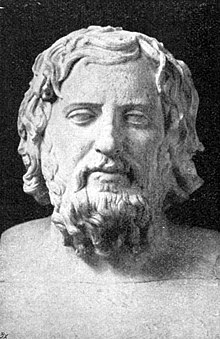Xenophon of Athens
| Xenophon of Athens | |
|---|---|

The Greek historian Xenophon of Athens.
|
|
| Born | c. 430 BC Athens |
| Died | 354 BC (aged approx. 76) |
| Occupation | Historian, soldier, mercenary |
| Children | Gryllus and Diodorus |
| Parent(s) | Gryllus |
Xenophon of Athens (/ˈzɛnəfən, -ˌfɒn/; Greek: Greek pronunciation: [ksenopʰɔ̂ːn], Xenophōn; c. 430–354 BC) was an ancient Greek philosopher, historian, soldier, mercenary, and student of Socrates. As a historian, Xenophon is known for recording the history of his contemporary time, the late-5th and early-4th centuries BC, in such works as the Hellenica, about the final seven years and the aftermath of the Peloponnesian War (431–404 BC), a thematic continuation of Thucydides' History of the Peloponnesian War. As one of the Ten Thousand (Greek mercenaries), he also participated in Cyrus the Younger's failed campaign to claim the Persian throne from his brother Artaxerxes II of Persia and recounted the events in Anabasis, his most notable history. Like Plato (427–347 BC), Xenophon is an authority on Socrates, about whom he wrote several books of dialogues (the Memorabilia) and an Apology of Socrates to the Jury, which recounts the philosopher's trial in 399 BC.
...
Wikipedia
